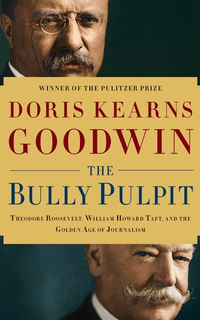Mentions
- Curated in 6 books I recommended for TED 2015
Historian Doris Kearns Goodwin studies the lives of America’s 26th and 27th presidents to examine a question that fascinates me: How does social change happen? Can it be driven solely by an inspirational leader, or do other factors have to lay the groundwork first? In Roosevelt’s case, it was the latter. Roosevelt’s famous soft speaking and big stick were not effective in driving progressive reforms until journalists at McClure’s and other publications rallied public support.

- Curated in 6 Books I’d Recommend (2014)
I read a lot about Teddy Roosevelt last year, around the time Melinda and I took our kids to the Panama Canal. He was instrumental in getting the canal built, and I’d assumed it was the highlight of his career. But it wasn’t. It’s a testament to the breadth and depth of Roosevelt’s accomplishments that the canal warrants only a handful of mentions in this biography. There’s just too much other fascinating material competing for space, from Roosevelt’s relationship with the press and his friendship with William Howard Taft (who was brilliant in his own right) to his efforts to fight corruption and reform the political system.
I’m especially interested in the central question that Goodwin raises: How does social change happen? Can it be driven by a single inspirational leader, or do other factors have to lay the groundwork first? Sometimes a single leader can make a big difference: In the field of global health, Jim Grant almost singlehandedly created a global constituency for children, sparking a movement to double vaccination rates and save millions of lives. But Roosevelt’s case was different. Although he tried to push through a number of political reforms earlier in his career, he wasn’t really successful until journalists at McClure’s and other publications had rallied public support for change.
I loved Goodwin’s Team of Rivals and highly recommend this one too.
